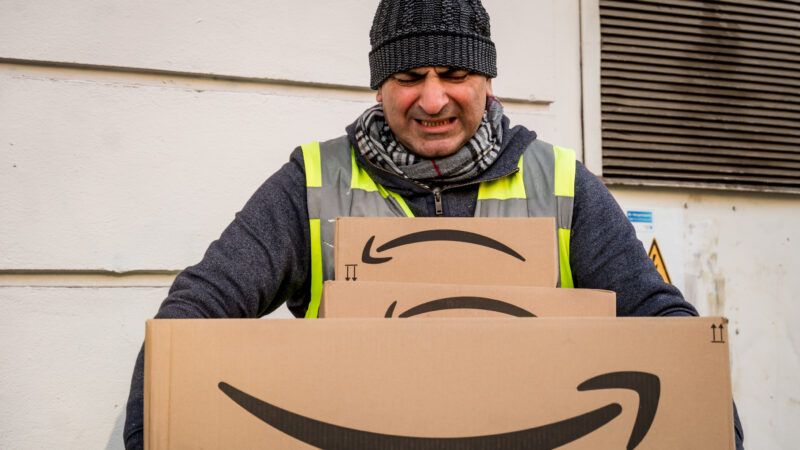A Bipartisan Tech Antitrust Bill May Soon Pass. It's Still a Bad Idea.
The legislation is likely to have a number of negative consequences for consumers.

There is a rising concern among politicians on both the left and right to rein in "Big Tech." While specific complaints vary, there is a general agreement among lawmakers that the very largest tech companies, like Apple, Alphabet (which owns Google), Meta (which owns Facebook), and Amazon, simply exercise too much power.
One bill, the American Innovation and Choice Online Act (AICOA), purports to make "certain discriminatory conduct" illegal when practiced by tech platforms. The bill has been around since last year, sponsored by Sen. Amy Klobuchar (D–Minn.) and a bipartisan group of senators, but according to Reuters, lawmakers expect that it will soon pass.
Unfortunately, the bill contains serious flaws which undermine its entire mission statement.
As drafted, AICOA is intended to prevent self-preferencing, whereby tech companies promote their own products or services to their users, on the grounds that it could "materially harm competition." For example, this would prevent Google from displaying Google Maps in search results, forcing users to take further steps if they would like directions to a particular place they had just searched for. Apple could be forbidden from pre-installing FaceTime or iMessage on its iPhones or told to open up its App Store to competitors.
Amazon, in particular, stridently opposes the bill. Earlier this month, Brian Huseman, Amazon's vice president of public policy, wrote that the company feels singled out as "the only retailer…covered by this proposed legislation." Indeed, the bill is written so narrowly that it only covers a handful of companies. Huseman writes that the bill would "degrade the value and quality of [Amazon] Prime" by forbidding the company from offering one- and two-day free shipping without allowing "other logistics providers" to fill those orders. Additionally, Huseman claims that the bill could "meaningfully jeopardize our marketplace" by subjecting Amazon to certain restrictions on usage of customer data that would not apply to "other retailers…such as Walmart, Target, and others." Per Huseman, "we believe…the real, unstated goal of the legislation" is to "hurt" Amazon.
In response, Bill Baer of the nonpartisan Brookings Institution wrote that the bill is "more nuanced (and thus more complex) than that." Baer writes that rather than banning certain behaviors, AICOA makes it so that government officials "must first convince a federal district court that they are likely to have a meaningful anti-competitive effect." In addition, Amazon or any other targeted service would have "the opportunity to mount an affirmative defense," such as that its behavior was "necessary to prevent a violation of law, to protect user safety and privacy, or to maintain or enhance the core viability of the platform," or that it "[had] not and would not result in material harm to competition."
But that's hardly comforting: Whereas now, Amazon merely has to convince consumers to buy its products, under AICOA, it would have to further convince a judge, at its own legal expense, that its methods and practices are not sufficiently anti-competitive. Further, the penalty for any violation would be "an amount not greater than 15 percent" of total revenue "for the period of time the violation occurred." Baer acknowledges "the maximum civil penalty is severe" but waves it away by saying that "in our federal judicial system…maximum penalties are rarely imposed."
This week, four Democratic senators sent Klobuchar a letter, detailing concerns with AICOA. They worry that the bill would make it illegal to "discriminate in the application or enforcement of the terms of service…in a manner that would materially harm competition." This would in turn "imperil current content moderation practices" by disincentivizing a platform from moderating content. Indeed, Apple's App Store—which would be targeted by the bill—currently requires app makers to filter "objectionable content."
Writing in WIRED, Gilad Edelman found this argument "weak." But it should be noted that for some lawmakers, this is their explicit intent: During the markup session for the bill, Sen. Ted Cruz (R–Texas) indicated that tech platforms should be held accountable for their content moderation decisions, stating, "I am more than happy to unleash the trial lawyers."
On Tuesday, Klobuchar tweeted that "Businesses support our bill because it's PRO-business," linking to a news piece citing "dozens" of businesses and business organizations. Meanwhile, the U.S. Chamber of Commerce, as well as the chambers of 46 states, announced their opposition to the bill on Wednesday. The chambers charged that the bill "would shift the focus of antitrust from promoting competition to protecting competitors from competition" and "would punish some companies for competing vigorously while leaving other companies free to engage in the exact same conduct.
"In the future, the federal government would decide whether a company can innovate, lower prices, or offer free shipping and other services – or whether such vigorous competition is unfair."
Start your day with Reason. Get a daily brief of the most important stories and trends every weekday morning when you subscribe to Reason Roundup.
NEXT: Stellar Casting Elevates Boomer Spy Thriller The Old Man
Joe Lancaster is an assistant editor at Reason.


Show Comments (12)